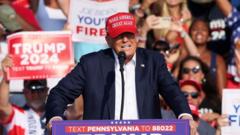In a recent Oval Office meeting, South African President Cyril Ramaphosa countered Donald Trump's provocative assertions regarding white genocide in South Africa, while emphasizing the need for unity.
Ramaphosa Stands Firm Against Trump's Controversial Claims on South Africa’s Safety

Ramaphosa Stands Firm Against Trump's Controversial Claims on South Africa’s Safety
Cyril Ramaphosa successfully navigates a tense exchange with Donald Trump over violence in South Africa
In a politically charged meeting yesterday, South African President Cyril Ramaphosa was faced with a barrage of allegations from U.S. President Donald Trump, who invoked fears of "white genocide" to underscore safety concerns in South Africa. Trump displayed videos portraying the controversial rhetoric of South African politician Julius Malema, notably his inflammatory "Shoot the Boer" chant, which has been a flashpoint for right-wing Afrikaner groups.
Ernst Roets, a prominent figure within right-wing circles, hailed Trump's stance and framed it as a moment of historic importance, expressing gratitude for raising awareness of the plight of white farmers. In stark contrast, Ramaphosa managed to maintain composure while addressing the claims, asserting that South Africa is a democratic nation where the opposition party, including Malema and the Economic Freedom Fighters (EFF), has the right to exist, despite disagreeing with their rhetoric.
The backdrop to this intense dialogue lies in the political landscape of South Africa, marked by a government of national unity while grappling with complex socio-economic issues, including a staggering unemployment rate and rampant crime affecting all racial communities. Ramaphosa underscored this by highlighting to Trump the necessity of a collaborative approach to tackle these challenges, stating that crime, not race, must be the focus of concern.
John Steenhuisen, the leader of the Democratic Alliance and part of Ramaphosa's delegation, echoed this sentiment by advocating for increased policing resources and challenging the narrative that white farmers were fleeing the country en masse. He argued that the majority of South African farmers remain committed to their land and communities.
The meeting also saw input from other notable figures, including billionaire Johann Rupert, who pointed out that the highest crime rates in South Africa are concentrated in impoverished areas, predominantly affecting the black population. Zingiswa Losi, representing the largest trade union in South Africa, urged recognition of the broader societal issues of violence that impact all communities and stressed the need for international collaboration to foster economic security.
As tensions over racial dynamics continue to permeate South African society, Ramaphosa's approach appears to resonate with many who value democratic ideals and unity amidst adversity, drawing parallels to the legacy of Nelson Mandela. While some Afriikaners may feel alienated and look to Trump for refuge, the overarching message from the Oval Office meeting remains clear: addressing crime as a universal issue, rather than amplifying racial divides, should be the path forward for South Africa.
In navigating this politically fraught encounter, Ramaphosa not only defended the dignity of his nation but also illustrated a commitment to solving the multifaceted crisis through cooperation and understanding rather than conflict. As the dialogue surrounding South Africa’s future unfolds, the importance of societal harmony and unity becomes increasingly vital against the backdrop of rising global tensions.



















